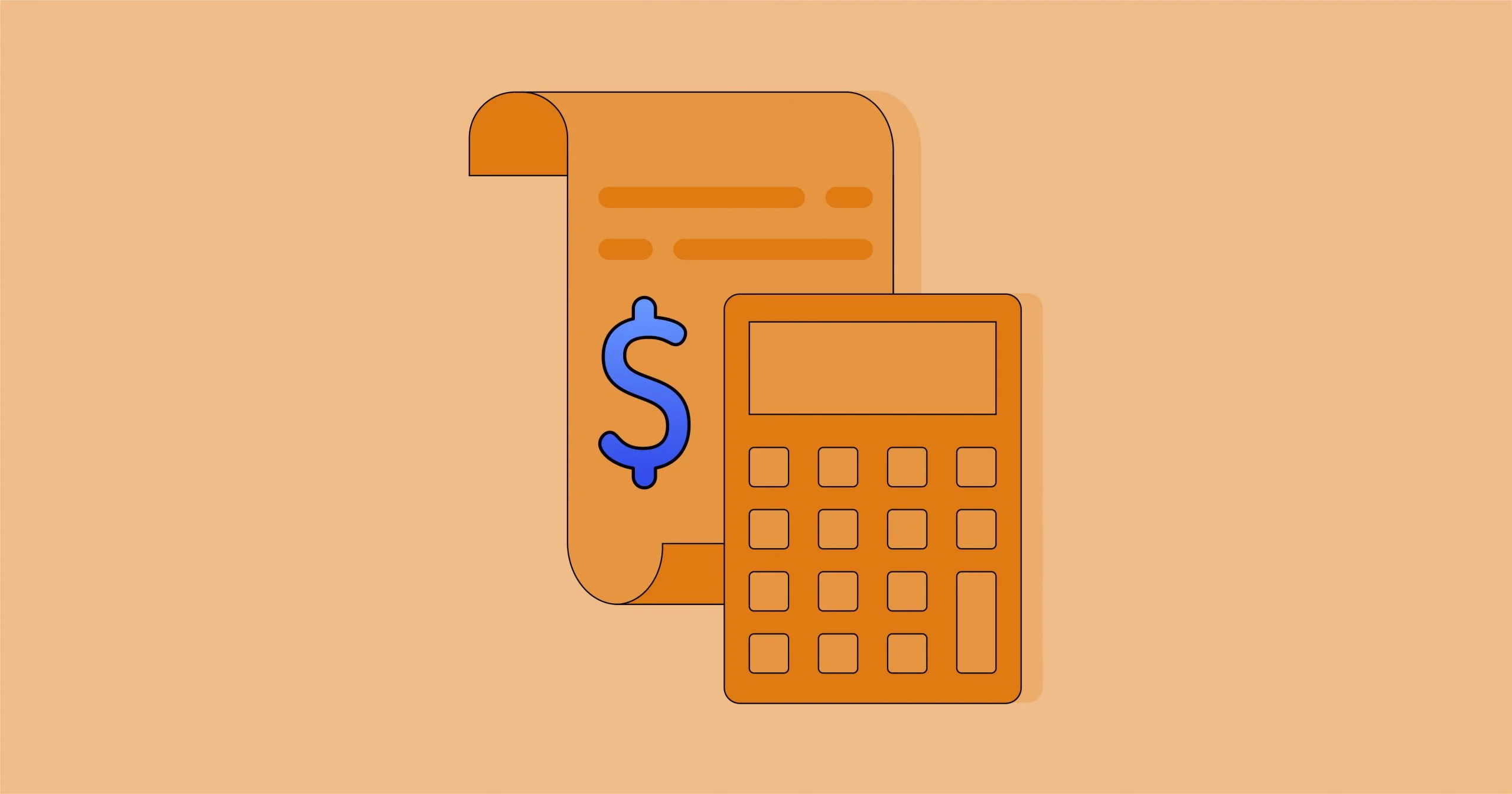
Why Accountants Should Leverage Ecommerce Automation
Contents
Many accountants are hesitant to work with ecommerce businesses because they’re afraid of new technology and wading through massive amounts of data. But modern-day solutions were designed with accounting professionals in mind. With automation tools at their fingertips, it’s easier than ever for accountants to take advantage of the booming industry and add value as trusted business advisors.
To share some expert tips for accountants, Webgility’s own CEO and Founder Parag Mamnani partnered with Jody Padar, CPA and VP of Strategy at Botkeeper, to offer a webinar about how accountants can leverage automation to create better relationships with their ecommerce clients. Watch the recording or read the transcript below to catch these expert insights on growing an accounting business with ecommerce.
Jody Padar, Botkeeper: Today, we’re going to be defining and learning about optimizing and growing an ecommerce niche. We’re really excited to talk about how automation can help with your ecommerce niche.
Parag Mamnani, Webgility: Thank you for giving me this opportunity to chat with everyone here today. My name is Parag Mamnani. I’m the founder and CEO of Webgility. I’ve been in the ecommerce and now also the accounting space for almost two decades. My company is called Webgility and we specialize in providing automation and intelligence to ecommerce merchants.
One of the key automations we deliver is to automate accounting for ecommerce businesses and omnichannel businesses. I’m excited to chat with everybody today. In my past life, I was running an SMB [small and midsize business] platform at Amazon. I’ve worked with thousands of small businesses, helping them get their ecommerce businesses up and running. I know a thing or two about ecommerce and am excited to share my feedback here.
Jody: Then there’s me, Jody Padar, The Radical CPA. My role at Botkeeper is vice-president of strategy, which is really to help CPAs learn how to implement their automation and go through that digital transformation. Today is going to be an exciting webcast because we’re going to do a lot of Q&A and it’s going to be very conversational.
We hope that you guys will join us in those conversations and ask lots of questions because we believe that sometimes the questions are the best part of learning, right? Because if you’re thinking about it, maybe someone else is thinking about it as well. We hope to give you that background about why automation is helpful in ecommerce and why it might be a profitable niche that you want to become a part of or improve your niche if you’re already there.
With that, I believe we have a poll. Go ahead and answer the poll question. “Do you work with ecommerce?”
Parag: It looks like you got 52% yeses and 48% noes.
Jody: Okay, so half our audience is already familiar with ecommerce. That’s pretty cool. I’m excited. Hopefully you brought your questions. We got another poll for you, so go ahead and answer the second poll question.
“Which option best describes you?”
- I have some ecommerce clients and have not yet automated
- I love ecommerce and only work with clients who have automated
- My firm doesn’t offer ecommerce, but we want to
- What is ecommerce?
I’ll give you a couple of more seconds to answer the question.
All right, so the poll is closed and responses are 45% of you say, “I have some ecommerce clients and have not yet automated,” and then 24% of you said, “My firm doesn’t offer ecommerce, but we want to.” 18% said, “What is ecommerce?” and 13% said, “I love ecommerce and only work with clients who have automated.”
Jody: Awesome, so I think we have a pretty good audience here in that many of you already have experience with ecommerce. Some of you have decided that it’s important to you and you want to learn about ecommerce. I’m excited about that audience because I think that everyone has an opportunity to learn something here today because ecommerce is so broad and we’re hoping that we’ll convince you that ecommerce is a niche you want to be in. We’ll kick it off. Parag, you can talk about the elephant in the room.
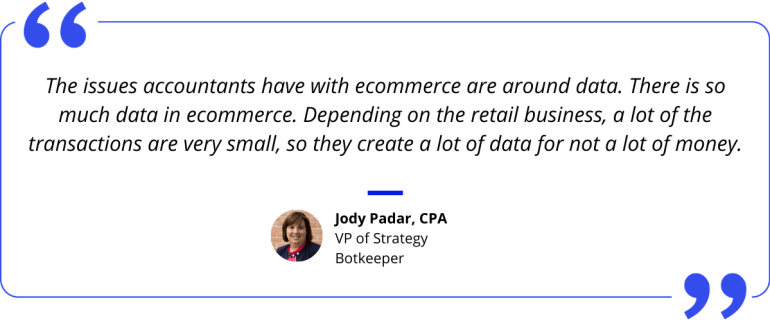
Why Accountants Don’t Want to Deal With Ecommerce
Parag: Looking back a few years ago, I would have been surprised if 50% was the number, so it’s already improving. Like you’re saying, half your audience knows about ecommerce, so that’s exciting. I guess in today’s world where we’re all sitting at home making online purchases, being an accountant and being a real steward of the industry, why do you feel that accountants don’t really want to deal with ecommerce? What are you seeing?
Jody: I think that the issues with ecommerce are around data. There is so much data in ecommerce. All these transactions are coming through. Depending on the retail business, a lot of them are very small transactions, so they create a lot of data for not a lot of money. When you’re dealing with all of that data, somehow somewhere, it needs to get reconciled. Then as accountants, do we want to do that?
I say that, meaning, yes, we know we need to reconcile that data, but we also know that a lot of times, it’s not profitable for our firms to reconcile it. We know that sometimes the detail wasn’t even necessary. If you think about an old-school POS system where an accountant would cash out at the end of the day and just record the totals, they wouldn’t record all the detail.
We also know that sales tax is somewhat complex and involved in ecommerce and technology. Aside from the technology to do the accounting piece of it, there’s all the connectors. There’s the POS systems and all of those systems. I think for many accountants, it’s been like this thing that they just don’t want to get engaged with because they’re afraid of it. They’re afraid of everything that’s there and surrounding it.
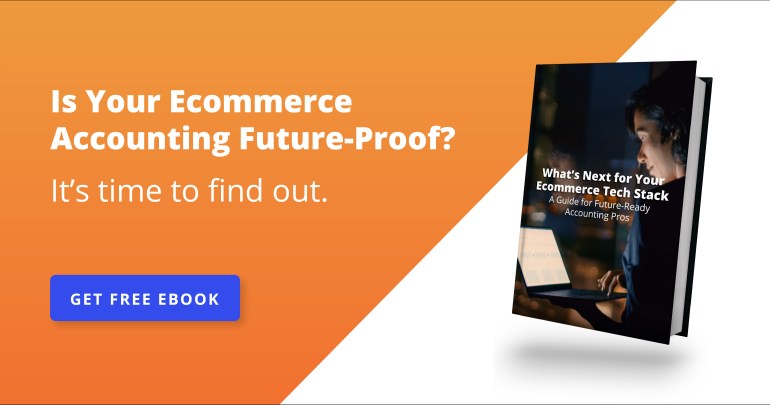
Parag: If I peel back that response, it sounds like there’s a technology challenge, so there’s a bit of a fear that I have to learn new technology to be able to deal with ecommerce. There’s certainly a data challenge because you’re dealing with a lot of data and transactions that are in various formats across different platforms that you have to put together. Then there’s just the complexity of it.
There’s a familiarity that comes with dealing with the non-ecommerce, or let’s call it service-based businesses, where the ledger is perhaps a little simpler, right? Now, you’re adding this layer of complexity when you’re bringing in commerce and new technology. Certainly, to your point, lots of different tools. Is it really a choice now? What should accountants know about ecommerce? Because I’m not sure in today’s day and age, you can even get away from dealing with ecommerce, right?
Jody: Right, and I think about it too. The one other thing I forgot is sometimes there’s ecommerce business that are like side businesses, right? There’s a lot of work involved, especially from a compliance standpoint. Those customers, they may be doing it on the side and maybe they’re not making a lot of money. We know as accountants, there’s a lot of compliance that goes along with it. They may not be able to pay for what we know it takes. That’s, I think, the last piece of it, the profitability part. In reality, I agree, and that we can’t get away from it today because I would argue that every business is an ecommerce business, right?
Parag: Absolutely.
Jody: Especially after COVID, but even prior to COVID, we were going that way. Now, if you’re selling stuff on Facebook, are you not in an ecommerce business? If you’re selling stuff on Amazon, on eBay, on your website, it just seems like even regular businesses that traditionally were brick-and-mortar at least have a small part of their business, maybe 10%, that’s ecommerce and then it even grows from there.
Parag: Yes, leading up to this webinar, something that struck me I thought would be a great example to share with the audience is I have a three-year-old and she goes to daycare. You would never think, at least I didn’t, that our daycare is an ecommerce business. Our daycare provider uses an app to communicate. We know where our daughter is and they send photos every now and then, but they issue digital invoices.
They have an app that does invoicing. Now, you’ve got ecommerce transactions for every payment I’m making on a monthly basis for our daughter’s tuition. Our daycare also sells uniforms, which is interesting and unique that they sell uniforms for the school. They sell them through their Square site. There’s an ecommerce transaction happening there.
Literally, our daughter’s daycare is an ecommerce business. That should speak so loudly to everybody in the audience about the transformation that’s happening in the marketplace, where everything is moving toward commerce happening through digital means. That’s really ecommerce, right? That should answer your question for those folks who are saying, “Well, what is ecommerce?” Any transaction that’s happening digitally is ecommerce.
To your comment about selling on Facebook or any other social media channel, that’s really why, as an accountant, as an expert in the industry, you have to get familiar with all the nuances there. To all the points you mentioned, technology, being familiar with the tools out there, knowing the complexity and compliance requirements, and then last but not least, really figuring out how to make that profitable, right?
Because while there’s a lot of technology and tools, those small businesses still don’t have deep pockets to spend a lot of money on doing accounting and reconciliation. Can you build a real good practice around it? We, I think, established that everybody needs ecommerce.
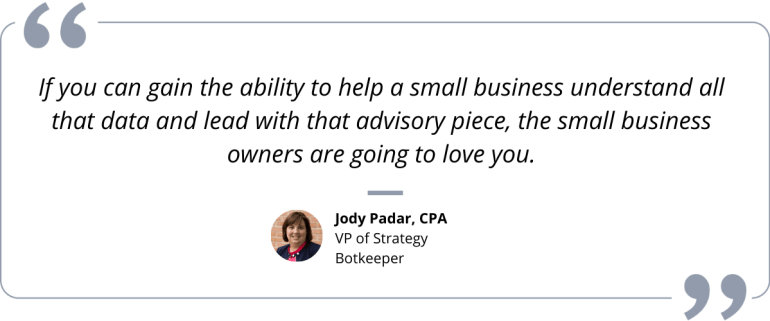
What Accountants Should Know About Ecommerce
Parag: Jumping ahead, what should accountants really know about ecommerce? What are the things that really matter from an accountant’s standpoint when it comes to the world of ecommerce versus specifics you could get into that could help the audience?
Jody: Well, I think you can’t get away with talking about ecommerce without talking about sales tax, right? Sales tax is probably the number one issue regarding ecommerce with the 2018 Wayfair Supreme Court decision and knowing the rules for the different types of items. Again, I think it was interesting when you used to do sales tax and it was in-state sales tax because you were very familiar as an accountant knowing the state rules. Now, you need to know all the rules, or at least know the basics of all the rules. I think that’s one of the most important things.
The other thing is I think it’s really important to realize that there are tools out there to help you consume all of this data so that you don’t necessarily have to be the one who’s reconciling it all, because anyone who’s done anything with some sort of PayPal account is having nightmares in their sleep about it, about reconciling a PayPal account. I think those are the fears that accountants have, but yet I don’t know if they know that there have been solutions in the marketplace to solve those problems.
Parag: Yes, I have to say, this is fundamentally different today versus, say, ten years ago. Certainly, the percentage of transactions that were happening online was much less. The number of systems that were available were much less. To your comment, sales tax was much simpler ten years ago ever since that Wayfair ruling.
Now, you’re required to collect sales tax based on certain local rules in that state. It’s not just about where you’re selling in your brick-and-mortar business. It’s now about every state where you have a presence. Simple things like needing to collect sales tax are now complicated because in a given state, if your revenue is beyond a certain threshold, then you have a nexus.
Jody: Right.
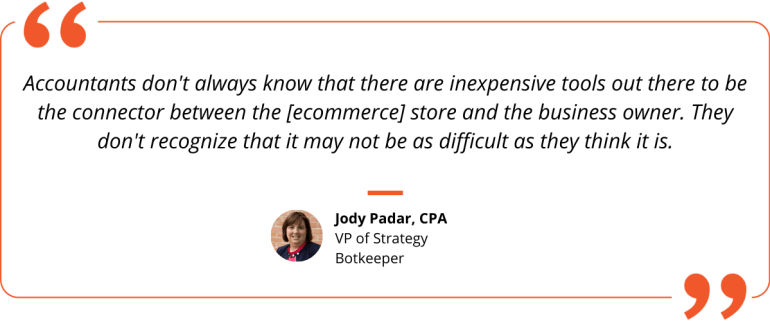
Ecommerce Automation for Accountants
Parag: There’s definitely a steep learning curve here. What do you think about that learning curve, especially for those that may be struggling with, “Hey, this feels hard. There’s a lot because I’m familiar with non-ecommerce, but how do I get over that fear of it being difficult?”
Jody: Again, it goes back to automation. I think that there are a lot of sales tax automation tools out there to help you that will calculate if you need sales tax or what that sales tax should be. Again, those tools weren’t there in the past.
It seems almost like it’s the perfect storm: there’s the problem of ecommerce from ten years ago with all the data, and now you have more people using it—the daycares are using it, and everybody’s an ecommerce business—and then there are the technology solutions that can simplify ecommerce for accountants. There are sales tax apps and reconciliation apps out there.
I think accountants who have traditionally been the ones to reconcile the data don’t always know that there are inexpensive tools out there to be the connector between the Amazon store and the business owner. They don’t recognize that it may not be as difficult as they think it is.
Parag: Yes, and coming back to the broader point, are you then also implying that accountants, maybe a decade ago, were relying heavily on their own expertise and perhaps Excel? Fast forward to today, tools and apps are almost a necessity to be able to serve the marketplace?
Jody: 100%. If you think about it, even from Botkeeper’s perspective, we have automation that digests all those transactions and reconciles them. Those are tools that weren’t available even five years ago that now do the heavy lifting for the accountant so that they can look at the higher-level stuff and know that everything’s in and reconciled. Now, they can actually think about it from a business perspective and help their clients with it.
I think that’s important too because accountants, we get caught in the detail of the reconciling and all the widgets of connecting everything. Sometimes that overwhelms us. If we can get a handle on it and we have automation tools to help us, then we can go back to treating ecommerce businesses as regular businesses. We can go back to those basic advisory skills that many of those small business owners need.
They need help thinking about cash flow. They need help thinking about inventory and what they’re selling, and understanding all that data that they collect. The business owner would love to have an advisory person walking alongside them, helping them understand all of this data. The cool thing about ecommerce is because there’s so much data, they give you all kinds of graphs and trends and things like that.
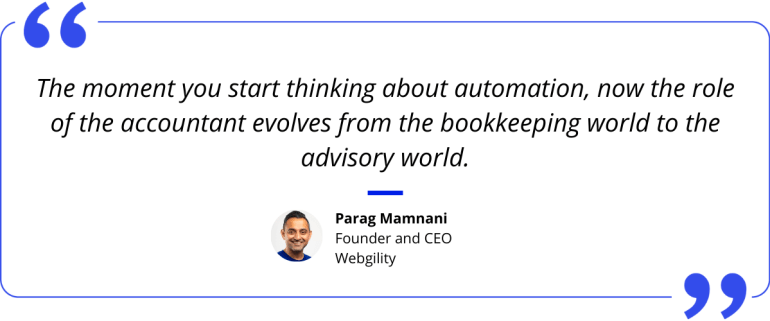
Understanding the Ecommerce Audience
Parag: Yes. To your comment, in fact, there’s an audience question here. If you call everything commerce, does it not lose all its meaning as being a niche? Well, frankly, everything’s a niche until it’s not, right? Everything starts off as a niche. Once enough adoption is there, we’re finding it shifts to be considered more mainstream.
Today, for example, in retail, especially with the COVID impact on the economy, you’ve got dramatic acceleration. Now, I think the latest stat is 20% of all retail is happening online, right? It’s an acceleration from what used to be below 18%, 17% a year ago. There’s been ten years of commerce acceleration in less than 12 months. Now, if so much of retail is happening online, you bet that small businesses are not going to be left behind in that way. Now, there’s almost two million sellers on Shopify. There’s just such a tremendous acceleration of businesses selling online. It frankly doesn’t feel to me like a niche anymore. It’s almost a necessity you have to deal with and understand.
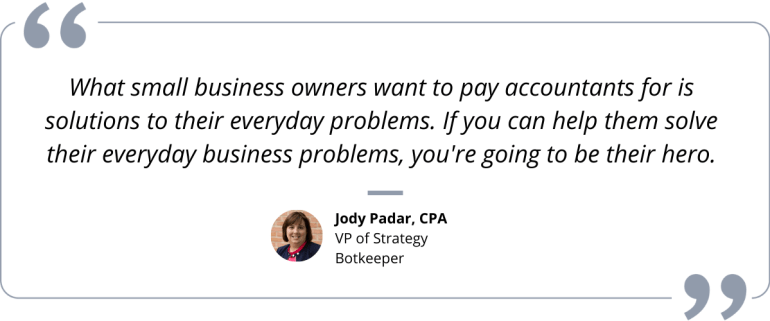
Data and Ecommerce
Parag: To your point about technology, and I know we’ll talk about tools in a moment here, but that learning curve can absolutely be solved by having the right tools. Maybe you have to get away from wanting to know all the minutia and details and rely on some of the tools to do the work for you. It dovetails into another question, which is: How does all this data really affect small businesses? Because it sounds like with ecommerce, there’s an explosion of the amount of systems and data that’s out there for these small businesses.
Jody: Well, I think that it can overwhelm them, right? On the other side of it, when you have data, you have information and that information is valuable. I think that is one of the hidden gems of ecommerce. When we talk about advisory, if you can really understand the ability to help that small business understand all that data and lead with that advisory piece, the small business owners are going to love you.
Because we’re using automation to collect the data, we’re not spending ten hours gathering it to come up with some report to say, “Okay, this is how your business did this month.” What’s pretty cool is, a lot of times, you can help them understand it on a daily, weekly, or monthly basis and even watch those trends, which is really what business advisors should be doing as an accountant.
Parag: Over the past decade, I’ve been to numerous conferences—I think we’ve crossed paths as well when they were in vogue: the Sleeter Conference, the Scaling New Heights Conference, the Intuit Connect Conferences. I think over the last decade, before, it used to be that the conversation was, “Are you in the cloud or not?” Then it was, “Okay, well, are you using all the different cloud applications that are available to help you automate?”
The moment you start thinking about automation, now the role of the accountant evolves from the bookkeeping world to the advisory world. Now, especially when it comes to commerce, you really can be that champion. Because if you have all the tools and that data, you can elevate from providing data and analysis to actually leveraging those tools to do that for you. You can provide better guidance to your customers on how they can grow their business.
Jody: It is also kind of a mind shift. I think that we have to really get comfortable with it, whereas before we had these tools, it was, “Okay, we got to get all the data in. We have to reconcile it. We have to make sure it’s correct. We have to do all our compliance reporting around sales tax.” We were maybe a month behind and we would be giving these reports to the business owner.
Whereas today, you have the ability to let the computer or the automation do all of that piece of it. Now, as accountants, we really have to get comfortable. I think most of us have those skills already. We just forget that they’re there, like reading the information that the data presents and helping your clients understand how to optimize it, right?
Parag: Right.
Jody: I think a small business owner may know that a certain thing sells out, but they don’t know necessarily when they should reorder or what they should do as far as expanding that line. Forecasting and budgeting are things they need help with, and that’s where we’re going to come in and really save the day. We can because we’re not so busy in the detail today.
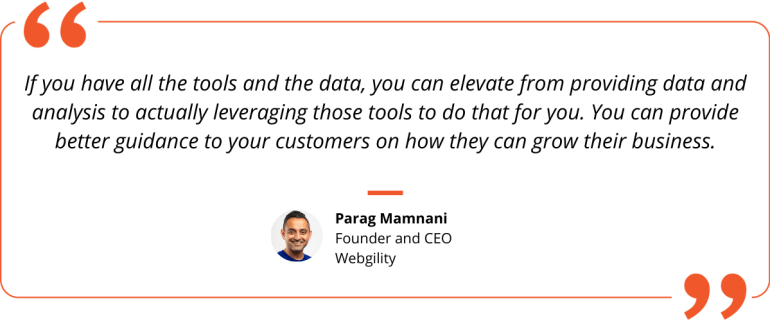
Billing for Your Ecommerce Accounting Services
Parag: I guess it’s clear that technology and apps are the answer, but I could imagine a lot of folks in the audience are thinking, “Well, sounds expensive,” right? “Sounds like there’s a lot of apps.” They also may be thinking, “Okay, well, how do I know? What are the best apps out there? Is this going to cost me a lot? Can I still build a profitable practice?” Can you talk a little bit about the expense portion of this, and can a good accounting practice be billed using these applications?
Jody: Absolutely. The first thing I think you have to get away from is billing by the hour. If billing by the hour is part of your other pieces of your practice, we won’t go there today. When you look at something like this when you’re using automation tools, you really got to get away from billing by the hour and coming up with some sort of fixed price or subscription-based pricing so that the business owner knows that they’re going to pay a monthly fee and that they’re going to get a certain level of output for that monthly fee.
Then what’s pretty cool about it is you’re going to know what your costs are, right? You’re going to know that you’re going to spend so much to get the data in and reconciled. You’re going to know that you’re going to spend so much to have all the apps connected. You’re going to know how much those apps cost because you’re going to price that stuff upfront. Then you’re going to put your advisory piece around it and probably a little bit of, I’ll say, accounting finesse around it because, again, there’s still apps.
You’re still going to want to make sure everything ties out and review your financials, but then you’re going to put that together in a package and you’re going to sell that for a monthly fee. What’s going to happen is your business owner is going to know what it’s going to cost them every month. You’re going to know what your internal costs are every month and so you’re going to be able to then be comfortable signing people up with this ecommerce piece.
Then the other piece of it is we’re essentially productizing a service as a way of doing it, but then the cool thing is you can learn what those metrics are that are important to your businesses because now, we’re breaking out into this, “Is it a niche, not a niche?” If we know that we have many small businesses who are using these tools together and they have ecommerce business problems, we can come up with the metrics with their problems because most of your clients ask you the same questions over and over again, right?
What will happen is you’ll learn the questions that these businesses are asking you and then you’ll be able to develop that as an advisory set around your most commonly asked questions. What’s pretty cool about it is many of the ecommerce sites themselves as well as the other apps give you that data served to you very nicely because they collect all the data and they’re putting it together in pretty nice packages, where then you can have those conversations with your client around the advisory piece.
Parag: Is it safe to say, Jody, that to make the real transition from hourly to packages, there does seem to be like this reset period? Like this time where the accountant or the firm needs to take a step back, dig in, learn the different tools, come up with the right plan and model, and then go out and really start to drive a set of customers through that experience and, obviously, continue to iterate, but it is fundamentally a change of mindset and moving towards advisory than the rhythm that most accountants are on, I think, on a monthly basis or every quarter or so working with certain companies closing their books.
Jody: Yes, absolutely. I think the biggest thing that’s pushing it today is, like I always say, how do you bill two minutes? If automation is going to do all this data reconciliation, how are you going to bill for it? If you continue to bill by the hour, you’ll either have a bazillion clients or you won’t make any money. Therefore, pricing has to shift. What’s cool about pricing though is although sometimes people feel intimidated by it, you can come up with a price and you can iterate along the way.
I think sometimes people think, “Oh, I can’t do this because I don’t know how to set the price.” Well, start with your costs. Know what your fixed costs are and make sure that you’re defining the scope of your services and what you’re doing. Then you can start thinking about pricing and what margins you need to make. I think sometimes it can seem overwhelming, but I don’t think it’s as overwhelming as it needs to be and you sometimes have to just dive in.
The other thing about it is if you have current ecommerce clients where you’re spending hours doing the reconciliations, I guarantee the tools are probably cheaper than your hours. Because if you’re spending all that time trying to reconcile all that data, the tools are definitely less expensive than a human being trying to make sense of all that data and reconciling it by themselves.
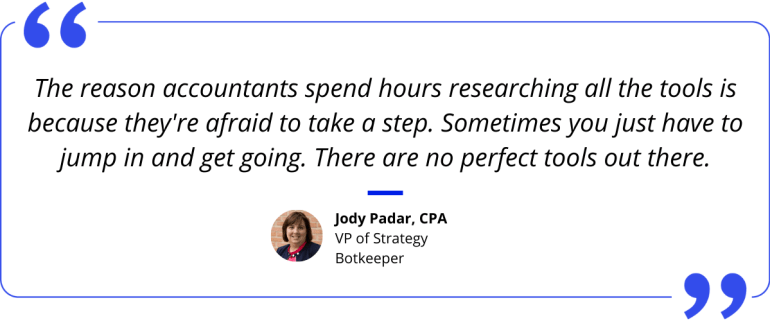
Shifting to an Advisory Role
Parag: It’s fundamentally also just the change of skill set. You’re not only providing the accounting advice, but by mastering some of the tools that are available there, you’re saving the business owner a lot of time. You’re able to automate a lot of their systems and give them insights that they didn’t have before. The value, I think, shifts from what would be a traditional accounting close to a more comprehensive advisory service.
You’re really helping them figure out how they’re going to grow and where their challenges might be in the business. This is actually really a great evolution for accounting as a practice because you’re able to really add a lot more value to every business that you’re working with.
Jody: 100%. The small business owners want answers to their problems. Yes, they need the compliance piece of it, absolutely. They have to be compliant with the law, but they don’t want to pay for that. What they want to pay for is solutions to their everyday problems. If you can help them solve their everyday business problems, you’re going to be their hero. That’s the piece that, I think, accountants have traditionally had a hard time with.
It’s not because we don’t want to because I know accountants love helping their clients. It’s because we’re so busy. We’re caught in that rat race of seasons, of closes, of tax season, of COVID season, right? We go from season to season, so it’s very hard to take that first step and say, “Okay, I’m going to do something a little bit different this month. I’m going to try it and I’m going to see how it makes a difference in this client’s business and in my firm as a whole.”
I think that’s where you have to just jump into it. You can overanalyze it. You can think about it. I love the way accountants spend hours and hours and hours researching all the tools. The reason they spend hours researching all the tools is because they’re afraid to take a step. Sometimes you just have to jump in and get going. There are no perfect tools out there. I don’t care what automation you’re doing. There’s nothing perfect because humans are going to have to make the pieces work together.
If you can have the automation do 90% of it and you’re just doing the last 10%, you’re going to give yourself time back and you’re going to save yourself a lot of headaches because you’ll get this stuff done. Your practice will become more profitable because you’ll be able to take on more clients. That’s another thing that automation really does is it helps to add capacity.
Maybe you’ll be the official daycare business provider for ecommerce—that’s what your niche becomes. It’s not just a specific niche, but that also niched out where you only do daycare providers who have ecommerce is that part of them. That’s where you can then build out on your practice there.
We’ve been talking for a while. I would love to see if there are any questions out there and if we can answer some questions for the audience.
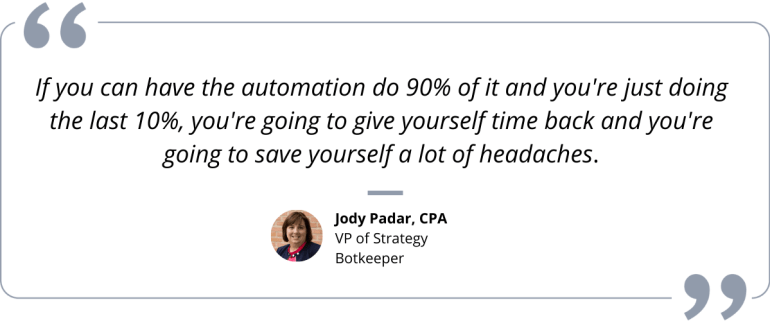
The Value of Accountants
Parag: Well, while we’ve got those coming in, Jody, I think when I reflect on all the accountants we’ve worked with, the question usually also comes up as when we have a lot of these ecommerce companies that work with accountants, what’s the real value-add there? Because if there are tools, can ecommerce companies leverage those tools directly? My thinking on that is, absolutely, there’s a lot of businesses that choose to go out there and bring a lot of these automation tools.
You will be surprised to learn that despite those businesses using some of those tools, they still continue to rely on accountants to help them. Businesses and business owners, as you all probably know, you start off wanting to be an accounting expert, right? As a small business owner, you have to get there with the help of advisors like your audience. To me, it’s not just about the tools. It’s about the accountant and the firm being able to really help those businesses.
Despite the mindset of the business, it’s usually, “Hey, I need accounting because I need compliance.” Compliance is not where it finishes. Compliance feels like the necessary thing, but the value-add is not just compliance. It’s making sure you can give the advisory on—especially for ecommerce companies—things like cash flow. Cash flow that comes up almost in every conversation we’ve had because that determines how much you have available to buy new inventory.
Inventory availability today—right now, we’re in this crazy market where the cost of containers is four times it used to be and availability is really just crazy. Even during regular times, knowing what to stock and how much to stock is so critical. It’s taking that step beyond, “Here are your books and they’re tightened up,” to, “Okay, your books are done. Here’s what we know about your business now.” What does forecasting look like? What is your cash flow going to look like? Where should you stock more? Which products are selling more or less? We had a few different questions come up, Jody. We can jump on those.
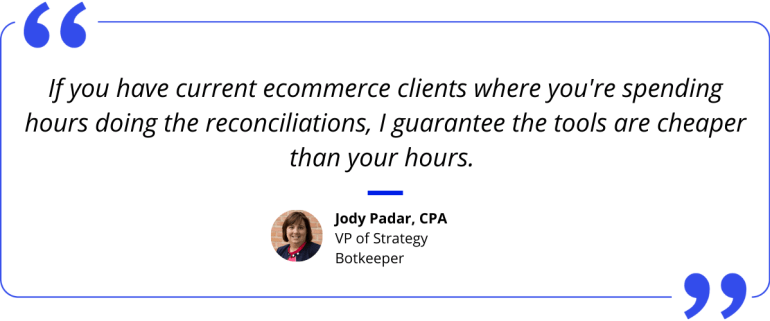
Ecommerce Reporting Tools
Jody: A couple of questions came up, but someone added, “From my perspective, we use reports from the ecommerce sites.” That’s great that you’re using the tools that are already being delivered to help your small businesses understand them because they’re collecting all this data, and so the more we can help the small businesses understand the data, the better.
Parag: One of the things I find about those ecommerce reports is they tend not to paint the full picture. When you look at platforms, for example, if you’re an Amazon seller, you probably get a pretty elegant report that tells you how much money you made on Amazon, including your settlement and the deposits you got at the end of every settlement period. The problem is it doesn’t know what the cost of the item was. Even though you know how much money you got from Amazon net, you don’t really know what your profitability is and it doesn’t tell you what you need to forecast.
Individual platforms can do a great job of telling you trends and what happened on that platform, but most of those ecommerce platforms don’t have the back-end data, the accounting data, the cost data that really paint the full picture of how your business is performing. That’s frankly, shameless plug here, but that’s really where Webgility and tools like ours come into the picture because your standalone revenue report from one ecommerce channel doesn’t really give you the full insight you need to make those decisions.
Jody: It doesn’t pull it all together.
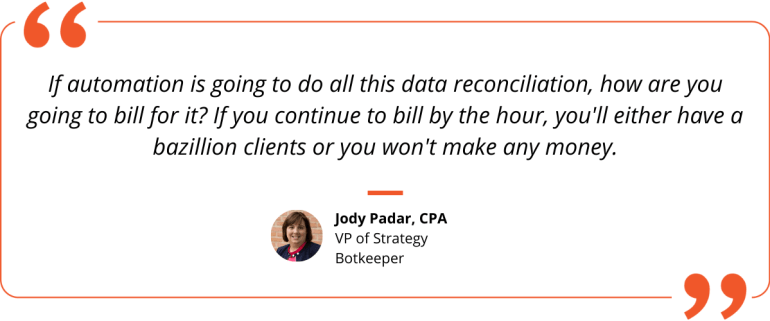
Pricing for Automation Tools
Jody: Here’s another question: “How do you price differently for businesses with ecommerce elements as opposed to, say, a service business, and do you make them pay for tools?” What I do is I’ve always included my tools and my cost—so they pay me and I pay for the tool. Now, there are different schools of thought on it, but my response is always: I want control of the tools that I use. I want to make sure that I can standardize how I serve my businesses.
If you let the small business owner choose, then you might have to support five different tools. If you say, “We’re only going to use this one tool,” then the small business owner really doesn’t care because they don’t really shop between tools. They don’t balk at the price because it’s included in their monthly service price. You can standardize your backend—it can become crazy if you have to learn 15 different tools.
If you only have to learn one or two tools in each specific niche that you’re serving, it’s not a big deal. It’s really important for accountants to standardize the tools that they’re going to use. Then also, it’s really important to pay for them on our end so that, again, the client can’t back out and say, “Oh, I don’t want to use that. Give me a cheaper price.” No, it’s one price and this is our service offering and this is how you’re going to purchase services from us.
Parag: In fact, we’ve worked with hundreds of accountants. The typical success story we see there is don’t have your customers worry about the tools and the details. Focus on the end result, right? If you’re providing closing of the books, you’re providing advisory, think about what is the end value that you’re delivering and then figure out internally for yourself. Like you said, the cost isn’t what the right tools are.
Jody: I think what it comes down to again is if every business is an ecommerce business, we all, no matter what you do in accounting, need to be aware of the tools and how to help your customers because what you don’t want to happen is for your customer to come to you from Webgility saying, “Hey, I found this tool. Can you help me with it?” You want to be the one who brings the tool to your customer.
I think that sometimes we get caught in that because we’re not aware of what’s out there, but I think it’s really important as accountants today that we are aware of these tools and can offer value before the small business owner finds it online and comes to us asking us for help with it.
Jody: I just want to thank you all for being participants here for listening to both Parag and I talk about ecommerce and business in general and how it’s changing and how we as accountants need to adapt to it.
Parag: Yes, awesome. Thank you, Jody, for having me on here, and thank you all for listening, wishing you the very best.
ABOUT BOTKEEPER
Botkeeper is a leading automated bookkeeping solution that provides accounting firms and their clients a powerful combination of skilled accountants, machine learning, and artificial intelligence. The various packages provide full-suite bookkeeping & pre-accounting solutions, a consolidated platform consisting of tools to optimize firm processes, and the highest quality support, all designed to meet our clients’ unique needs at any stage of growth. Accounting firms running on Botkeeper are able to grow their book of business, diversify their service offering, increase capacity, and reduce stress during tax time—all while improving their overhead costs. The powerful and easy-to-use solution has helped firms across the United States to maximize their potential, better serve their clients, and do more of what they love.



 The Webgility Team
The Webgility Team


